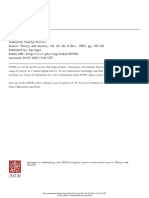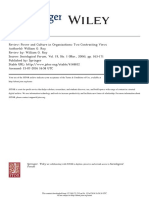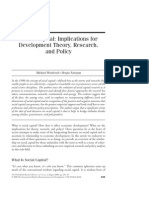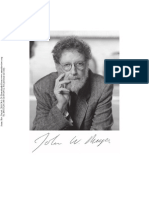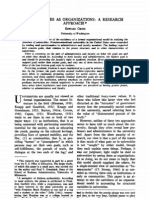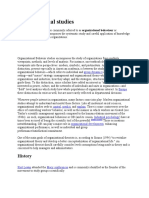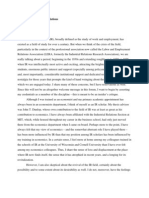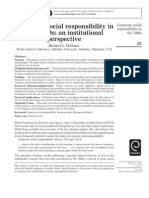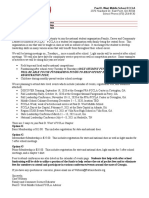2013 King Relevance of Organizal Sociologyf
2013 King Relevance of Organizal Sociologyf
Uploaded by
Yeris ToroCopyright:
Available Formats
2013 King Relevance of Organizal Sociologyf
2013 King Relevance of Organizal Sociologyf
Uploaded by
Yeris ToroOriginal Title
Copyright
Available Formats
Share this document
Did you find this document useful?
Is this content inappropriate?
Copyright:
Available Formats
2013 King Relevance of Organizal Sociologyf
2013 King Relevance of Organizal Sociologyf
Uploaded by
Yeris ToroCopyright:
Available Formats
Ó American Sociological Association 2017
DOI: 10.1177/0094306117692563
http://cs.sagepub.com
CRITICAL-RETROSPECTIVE ESSAY
The Relevance of Organizational Sociology
BRAYDEN G. KING
Northwestern University
b-king@kellogg.northwestern.edu
Organizational sociology is, by most stand-
ards, a fundamental part of the discipline— Manufacturing Morals: The Values of
after all, figuring out how to collectively Silence in Business School Education, by
organize ourselves is a core problem of any Michel Anteby. Chicago: University of
society—but many have wondered if it’s Chicago Press, 2013. 231 pp. $19.00
a subfield on the brink of irrelevance. Blog paper. ISBN: 9780226323510.
posts and a recent ASA session have been
dedicated to this question: what is the future Hyper-Organization: Global Organizational
of organizational sociology? There are Expansion, by Patricia Bromley and
numerous institutional reasons that organi- John W. Meyer. Oxford, UK: Oxford
zational sociology has moved toward the University Press, 2015. 232 pp. $35.00
periphery of the discipline, including the paper. ISBN: 9780199689866.
lack of sociology jobs in the subfield and
the fact that many organizational sociolo- The Vanishing American Corporation:
gists, this author included, are no longer Navigating the Hazards of a New
housed in sociology departments but in Economy, by Gerald F. Davis. Oakland,
business schools. But if we put aside the CA: Berrett-Koehler Publishers, 2016.
questions of where and how organizational 240 pp. $29.95 cloth. ISBN: 978162656
sociologists are trained and get jobs, at the 2790.
heart of the problem is whether organiza-
tional sociology has anything new to say to The Fracturing of the American Corporate
sociologists who do not study organizations. Elite, by Mark S. Mizruchi. Cambridge,
If organizational sociologists are becoming MA: Harvard University Press, 2013.
irrelevant, it is because we are increasingly 363 pp. $37.00 cloth. ISBN: 97806740
disconnected from the conversations most 72992.
central to sociology as a discipline.
It was not always this way. Starting in
the mid-1970s and then peaking in the these different types of organizations looked
early 1980s, organizational sociology went so similar to one another in important ways.
through a period of vibrancy and creativity The lifeblood of organizational sociology
that led to the generation of several theoretical was an examination of the historical trends
perspectives and research programs that in organizing and an attempt to develop
left an indelible imprint on the discipline. a more ‘‘social’’ explanation for these trends.
This work was motivated by attempts to bet- Organizations were (and are) building blocks
ter understand the rapidly emerging and in contemporary society, and it was hard to
increasingly complex organizational world— find any major social problem, whether it
populated by complex bureaucracies in the be race or gender discrimination, economic
public sector and sophisticated legal fictions inequality, or colonialism/globalization,
that dominated the marketplace. Ecologists that did not implicate organizations in
wanted to explain how such organizational some way. Organizations were sources of
diversity came to be, and institutional domination and exploitation, as well as
scholars wanted to understand why all of potential mechanisms for addressing social
131 Contemporary Sociology 46, 2
132 Critical-Retrospective Essay
injustices. Scholars like Philip Selznick and Charles Perrow’s Complex Organizations: A
Mayer Zald cared about organizations in Critical Essay, James Coleman’s The Asymmet-
part because they believed that well- ric Society, and Philip Selznick’s TVA and the
functioning organizations could help com- Grass Roots. Today most organizational
munities realize their aspirations. But it was scholars, including me, write articles, not
also hard to ignore the reality that organiza- books. Although articles are suitable for
tions, especially those created for business communicating an empirical finding, they
purposes, could also be tools of exploitation are less suited than books for dealing with
and class dominance. The work of organiza- deep investigations of important historical
tional scholars like Alvin Gouldner, Michael topics.
Burawoy, and other neo-Marxists reminded It is, therefore, exciting whenever a new
us that organizational bureaucracies were book is published by a leading organization-
potentially corrupting structures that pri- al scholar that presents a fresh take on the
marily benefitted the wealthy and powerful. role of organizations in society. This is what
When Charles Perrow wrote of living in an Gerald Davis offers in The Vanishing Ameri-
‘‘organizational society,’’ he described can Corporation: Navigating the Hazards of
a world in which organizations were the a New Economy, which is written for a general
dominant institutions of modern life, con- audience but manages to be highly relevant
trolling political and economic power and to sociologists interested in big, historical
creating a ubiquitous backdrop for most questions. Davis’s main thesis is pretty
social interactions. Certain organizations— straightforward: the public corporation is
especially the public corporations that pro- in decline in the United States, and this
vided employment to the masses—exerted will have profound consequences for how
special influence. Not only did these large, we organize social and economic life.
public institutions form the backbone of Readers who have followed Davis’s work
employment, but the executives and direc- for the past couple of decades will not be
tors who oversaw these companies were surprised by his punchline that public
the political and economic elite that main- corporations have been stripped of their for-
tained the stability of our capitalist and dem- mer economic power. His previous book,
ocratic institutions. Although sociologists Managed by the Markets, was an exploration
have often been quick to point out the poten- of how financial markets reshaped firms,
tial for the abuse of the power that large reducing them to assets that could be
corporations grant the elite, those same insti- bought, sold, liquidated, and made expend-
tutions have added to the regularity and nor- able whenever their purposes ceased to be
malcy of social life. relevant to value-maximizing shareholders.
Inasmuch as organizational sociology has The logical consequence of the financiali-
drifted from its original intent to understand zation of markets is that corporations are no
humankind’s relationship to society via longer the trusted institutions they once
organizations—as tools for collective pur- were and the social contract between corpo-
pose but also potential sources of domination rations and employees has been completely
of the very humans who created them—it has broken. Whereas public corporations used
become less relevant to the broader disci- to dominate the economy, their number is
pline of which it is a part. shrinking rapidly, down from over 8,000
As both a participant in and observer of public corporations in 1995 to just over
this subfield, I also think there is a tactical 4,000 in 2014. The largest corporations no
reason for the disconnect between organiza- longer employ the vast number of people
tional sociology and the rest of the discipline. they once did. In 1972, all of the top five larg-
Organizational sociologists write fewer est corporations by market capitalization had
books than they did in the past and fewer over 100,000 employees, but in 2012, among
books than sociologists in other subfields. the top five largest corporations only
Classic works of organizational sociology Walmart exceeded that mark (with 2.2 mil-
that attempted to address these big historical lion employees globally). Apple, which has
questions about organizations’ place in soci- the largest market cap, only had 76,000
ety often came in the form of books, like employees. Instead of offering permanent
Contemporary Sociology 46, 2
Critical-Retrospective Essay 133
employment, corporations are now more mediated through employment by large
likely to contract with suppliers and corporations. Cemented through labor
outsource much of their labor to smaller agreements, such as the Treaty of Detroit
businesses. that was struck between General Motors
Davis says that the main reason public and the United Auto Workers, employee
corporations are disappearing is because benefits became the U.S. version of welfare
they are just too costly to run compared to state provisions. Health insurance, retire-
smaller, more flexible alternatives. Public ment pensions, and unemployment wages
corporations are more heavily regulated, were all tied to employment. As corporations
they are required to disclose more informa- have shrunk, so have their benefits—but
tion about their balance sheet and policies, without any suitable replacements offered
and they are more subject to public scrutiny. by the state. Davis points out that the costs
Private forms of business, in contrast, are less of being a ‘‘benevolent employer’’ may actu-
transparent than corporations, a fact well ally discourage companies from taking on
known to activists and to any organizational full-time employees, further incentivizing
sociologist trying to dig up information them to resort to temporary employees or
about the bad behaviors of companies. Pri- contract workers.
vate companies operate under the radar Davis’s colleague at the University of
and have far fewer legal restrictions on Michigan, Mark Mizruchi, offers his own
what they can do and say. Being public spin on the decline of corporations as institu-
means being accountable to investors, acti- tions in his book, The Fracturing of the Ameri-
vists, and even academics. can Corporate Elite. Whereas Davis focuses
If the reaction of the reader to corpora- on the effects of corporations on employ-
tions’ decline is ambivalence or perhaps ment, Mizruchi emphasizes their loss of sig-
even joy to hear that economic concentration nificance to policymaking. Mizruchi views
is being broken up into smaller parts, Davis corporations as vehicles for elites to acquire
provides plenty of reasons to be wary. For and allocate resources but also as network
example, he implies that the ability of private hubs for class formation. This view of corpo-
companies to avoid scrutiny may actually rations as tools of the capitalist class appeals
contribute to economic inequality. ‘‘Anyone to those who subscribe to elite theory in the
can look up the compensation packages of tradition of C. Wright Mills. Corporations
the top five corporate executives of any listed are tools for domination, they would argue.
company for the past 20 years [on the SEC’s But Mizruchi’s empirical analysis has
EDGAR database] . . . Now try to find the a twist. He contends that the elites who
same information about Koch Industries, have commanded corporations have become
which is privately owned and not required increasingly disconnected from one another
to tell the public what it earns’’ (p. 87). He and are consequently less capable of forming
points out that corporate size is highly nega- and realizing their class interests. Corpora-
tively correlated with income inequality tions have thus become an ineffective form
within the firm (-0.9). The smaller the compa- of governance, at least if we equate gover-
ny, the more inequality there is. Is it possible, nance with promoting the interests of
then, that one reason we see less economic capitalists.
upward mobility is that public corporations Mizruchi thinks that the decline of a corpo-
are disappearing and getting smaller? Davis rate elite has been really terrible for society as
believes so. He argues that corporations ‘‘cre- a whole. (I’m sure this is where he loses many
ated a legible career map . . . and could be elite theorists and neo-Marxists!) Even if
held to account for discriminatory practices. corporations were meant to serve elites,
As corporate employers have declined, they also bound elites to the employees and
careers have been replaced with jobs, and communities on which they depended for
jobs are being replaced with tasks’’ (p. 149). smooth functioning. For much of the twenti-
The decline of corporations has also dealt eth century, the elite class sought to unify
a major blow to the social safety net in the around a policymaking agenda that promot-
United States. In the post-World War II era, ed the good of commerce. Embodied in the
the provision of welfare benefits was largely Committee for Economic Development, the
Contemporary Sociology 46, 2
134 Critical-Retrospective Essay
corporate agenda was thoroughly moderate. weakened the moderating force on the cor-
The recent memory of unrest before and dur- porate elite. It’s not surprising that the rise
ing the Great Depression and a mobilized of the New Left was accompanied by a surge
labor force after the war motivated the corpo- of neoconservatism in the United States.
rate elite to find solutions that would pacify Despite these reservations, Davis and
the working class. But Mizruchi also finds Mizruchi are overwhelmingly persuasive in
evidence that many corporate elites viewed their argument that corporations have
themselves, especially in the post-war envi- declined in economic, social, and political
ronment, as leaders of free society who significance. For organizational sociologists,
sought to lead responsibly. They saw corpo- the question we must answer is, what organi-
rations not just as mechanisms for creating zational models will replace corporations as
wealth but also as institutions serving the the predominant form? Davis has some
public good. things to say about this, although much of
But by the 1980s the elite became divided, his speculation about local economies and
partly due to the decline of labor union pow- community gardens seems idealistic to me.
er but also because the takeover wave threat- Can we really expect that our future econo-
ened managerial autonomy. Deregulation my will be made up of do-it-yourself, grass
unleashed financial forces and undermined roots-led community organizations? I don’t
managerialism as a governing ethos. As think so, and I’m not sure that Davis does
corporations shrank, so did the power of either. The answer to what comes next is
their elite. The unified corporate agenda dis- probably far more obvious and less exciting.
sipated. ‘‘The result was a new era, in which Organizations will thrive as they always
the moderate, pragmatic, and well-orga- have—bureaucracies as modeled by man-
nized elite that had been present at the top agement science—but perhaps they will be
of the corporate world since at least the smaller and more likely to be private (and
1940s began to disappear’’ (p. 221). hence more unequal, less accountable, and
Corporations, inasmuch as they seek to less responsible to their communities).
influence politics, are now islands unto The message of Patricia Bromley’s and
themselves, pursuing their narrow self- John Meyer’s Hyper-Organization: Global
interests. New elites have embraced ideolog- Organizational Expansion is in some ways
ical conservatism and are less likely to seek the very opposite of Davis’s. Organizations
political compromises. If Mizruchi is correct, are becoming more prevalent than ever. For
the current partisan divide may be partly these authors, public corporations are but
explained by the retreat of the corporate elite one type of organization, and whether they
from policymaking. are the dominant legal form is quite irrele-
Davis’s and Mizruchi’s views of corpora- vant. (Although, notably, they show that
tions as quasi-benevolent institutions will the number of multinational corporations
surely irritate scholars whose research has has increased dramatically from 7,000 in
documented the numerous ways in which 1970 to 63,000 in 2010.) Many more organiza-
corporations and the corporate elite have tions populate the earth today than fifty
failed to promote the public good. Davis years ago, and the growth of organizations
and Mizruchi may be guilty of being nostal- is not limited to the business world. Non-
gic about managerialism. Davis, in particu- governmental organizations have proliferat-
lar, seems to discount the role that labor ed at a more rapid rate than even that of
unions played in fighting for every little ben- business, and governments have become
efit they received from corporations. The more organizationally complex during this
decline of employee benefits is surely a result same time period. Bromley and Meyer
of the decline of labor union power. Mizruchi extend John Meyer’s career-long obsession
also seems to undervalue the changes in pol- with a rationalizing world culture made up
itics from the Old Left—one dominated by of ‘‘organizations [as the] fundamental units
labor unions and New Deal Democrats—to of order’’ transitioning from a society ‘‘dom-
the New Left, which accompanied the inated by structures like states, family firms,
rise of civil rights and identity politics. This trading empires, and traditional profes-
major political shift in leftist politics likely sions’’ (p. 9). The organizations of ‘‘late
Contemporary Sociology 46, 2
Critical-Retrospective Essay 135
modern society’’ are ‘‘thought to be more Bromley’s and Meyer’s perspective is
responsive, flexible, efficient, autonomous, shaped by a need to better understand con-
and accountable’’ than the bureaucracies temporary educational institutions and the
that emerged during Max Weber’s lifetime. organizational structuring of childhood. If
In fact, the organizations that Bromley and one takes childhood as an empirical setting
Meyer observe are much like the ‘‘virtual to test their claims, it’s hard not to walk
organizations’’ that Davis concludes currently away agreeing with them. Children’s and
populate the globe. They need not house vast parents’ time is increasingly structured
numbers of employees and are not strongly around organized activities, ranging from
embedded within traditional communities— recreational sports leagues to after-school
the organizations of today’s society exist large- enrichment activities. Whereas in the past
ly for themselves. They are actors in their own children’s play and learning occurred in fam-
right, with their own purposes, and they are ilies, local schools, and neighborhoods, in
constructed with a sense of agency that would contemporary society community organiza-
have been inconceivable a hundred years ago. tions, nonprofits, and schools contract these
Bromley’s and Meyer’s view of organiza- activities out to other organizations. Pick-
tions echoes my own perspective—which I up games of basketball aren’t completely
have written about with Teppo Felin and extinct, but it’s harder to find time for those
Dave Whetten (2010)—in which organiza- games in between children’s organizational
tions are described as ‘‘social actors’’ that obligations.
are seen as capable of action, legally and As children have gained status as actors
socially. The external attribution of actor- with their own rights to education and pro-
hood creates its own pathway for the emer- tection from abuse and exploitation, organi-
gence of character and intentionality within zational apparatus have sprung up to ‘‘legit-
organizations. They are built to perpetuate imate the value of children and childhood’’
themselves and to enact certain values (p. 83). Education is at the center of this
and objectives, long after their founders dis- childhood-structuring process, culminating
appear from the scene. Organizations in the promotion to higher education institu-
are thought to have autonomy and sover- tions that transform children into adults. Of
eignty, which allows them to control their course, the global expansion of higher educa-
own boundaries and coordinate behavior. tion also has ‘‘direct effects on the rise of
Bromley and Meyer take the argument sever- modern organization in the area of manage-
al steps further to argue that this conceptual- ment training’’ (p. 81). As children learn to
ization of actors is itself a late-modern phe- become adults, they also learn how to orga-
nomenon that has insinuated organizations nize. Bromley and Meyer point, in particular,
in most arenas in social life. The project of to the growth in the number of undergradu-
nation-building and societal development is ate business degrees and MBAs as strong evi-
one of building organizational actors. More- dence of the diffusion of management train-
over, the authors firmly believe that people ing as the common vernacular and knowl-
do not necessarily create organizations for edge base of an organizational society. But
rational or technical reasons. People could more generally, higher education has become
conduct many of the various functions of oriented around a ‘‘quantified and scientific
society without organizations, but organiza- curriculum,’’ which contributes to a rational-
tions are preferred nevertheless. ‘‘[O]rgani- ized view of how society ought to operate.
zations incorporate elements with indetermi- And if we think that this a narrowly Ameri-
nate value, even in the absence of direct com- can style of education, Bromley and Meyer
petition’’ (p. 149). And once an organization show that business degrees have grown
gets created, it perpetuates a cycle of organi- worldwide. Asian and European business
zational creation, spawning new partners, schools are currently growing at a faster
agencies, subsidiaries, and committees, all rate than the North American market.
for the purpose of carrying on the basic needs Newly minted MBAs are the field
of organizational life. Bromley and Meyer marshals of the global organizational expan-
refer to this as ‘‘internalized interdepen- sion. Whereas it used to be the case that a law
dence’’ (p. 153). degree was the default path for aspiring
Contemporary Sociology 46, 2
136 Critical-Retrospective Essay
leaders, over the last couple of decades the Anteby’s depiction of business schools as
MBA has replaced it. If we want to under- training grounds for organizational expan-
stand the motivating philosophy behind the sion would be troubling to idealists. Clearly,
global growth in organizations, we only there is a lot of value in the education given
need to wander into business schools and to students at places like HBS, which help
see how students and their instructors students learn how to think about problems
approach their training. Michel Anteby’s related to coordination, scaling, leadership,
Manufacturing Morals: The Values of Silence and strategic decision-making. There is an
in Business School Education does exactly effort across departments to take discipline-
this. The book is a fascinating insider’s relevant knowledge from fields like econom-
view of one of the most influential business ics, psychology, sociology, and organization-
schools in the world. Anteby did the al behavior and turn it into practical guide-
research for this book while teaching at lines about the best way to manage organiza-
Harvard Business School. ‘‘Few organiza- tions. But what is missing from this picture
tions aim to produce a shared perspective isn’t what organizations do but rather what
or set of morals as deliberately and consis- they ought to do. There is very little discus-
tently as’’ HBS (as it is usually called). sion in business schools, except in the stray
The question Anteby seeks to answer is business ethics class, about the values and
one that is not only central to organizational morals of organizations.
sociology but also germane to this broader Anteby’s book treats vocal silence as an
discussion of the dissemination of a world intentional strategy for the development of
culture of organizations: can an organization higher-order moral decision-making. Rather
routinize training in a particular set of morals than attempting to steer students’ values
or values? The answer is nuanced. He claims directly, by leaving choices with moral trade-
that HBS is able to convey a particular set of offs open to discussion, students are better
morals to its students and faculty; it does so prepared to make those decisions themselves
without directly communicating them but once they enter the managerial workforce.
rather by creating a ‘‘vocal silence’’ around But another interpretation of this effort is
standards of appropriate conduct. Moral that it gives students and managers permis-
codes are passed on implicitly: ‘‘the ways sion to avoid discussions of values altogeth-
other members talk about the organization er. As Anteby notes, the values that are
or convey particular expectations to each most embedded in the students’ daily scripts
other all indicate what conduct is consid- are those of ‘‘civility’’ and ‘‘decency.’’
ered proper’’ (p. 8). By signaling what is My own experience at a business school
‘‘doable,’’ rather than what a person ought resonates with his. Business school students
to do, the individual is given discretion in above all seek to be polite with one another,
how to apply that moral code to any given which means that certain topics that might
situation. be fodder in other schools of higher educa-
Anteby talks about how this vocal silence tion are strictly off limits in business schools.
operates at every level of the organization, Or if they are discussed, as for example when
from the day he is initiated as a faculty mem- a class dissects a case about a business deci-
ber to the interpersonal experiences he has sion to enrich demographic diversity in the
with students in and out of class. His ‘‘work- workforce, they are strictly approached as
ing ethnography’’ fleshes out an institution decisions related to maximizing shareholder
that is a mystery to many of us. That said, value or enhancing one’s own career options.
as I read the book, I found that the most inter- The problems with this are numerous,
esting parts had less to do with the routiniza- including that choosing to maximize share-
tion of morals and more to do with the moral holder value is itself a value that comes
content of business schools, more generally. with potential negative externalities (to bor-
If business schools are the main purveyors row the economists’ parlance) and potential
of our new world culture of organizations, tradeoffs with other moral choices.
then the content they teach ought to be indic- More detrimentally, if business schools are
ative of what types of organizations we will the breeding grounds for the future leaders
see in the future. of global organizational expansion, then
Contemporary Sociology 46, 2
Critical-Retrospective Essay 137
what models for organizing are they given? we must ask ourselves if we have the tools
What kinds of organizations will we have and theoretical frameworks to address these
in the future with such a limited moral issues. For better or worse, the future of orga-
framework? nizational sociology has become tied to this
Bringing Anteby’s book to bear on Brom- engine of organizational expansion. If we
ley’s and Meyer’s view of education as the are not engaged with historically important
root of organizational expansion creates questions, such as those addressed by Davis,
more questions than answers. Business Mizruchi, and Bromley and Meyer, we will
schools offer training about the best way to not be well equipped to offer useful perspec-
implement a decision, but they have little to tives about the future of organizing.
say about what types of decisions are It seems unquestionable that the org-
good for society. They have little to offer if anizational world is constantly evolving.
we’re considering how organizations’ values Old organizational forms—like public corpo-
affect public goods and resolve social prob- rations—outlive their usefulness and even-
lems. The future of organizing, then, seems tually are replaced by something else. But
strangely uninterested in the problems that what that something else is requires a sort
organizations are built to resolve. of creativity of thought that our own scholar-
And perhaps this is where organizational ship might be incapable of offering in its cur-
sociologists ought to have something to say. rent form. If organizational sociology wants
If public corporations are disappearing for to be relevant, not only to the discipline but
their lack of functionality and because the also to those who will build the organizations
elites that once steered them are disconnect- of the future, then we must be willing to step
ed, then there is clearly an opportunity for outside of our own small corners of the acad-
organizational innovation. Sociologists, less emy and ask big questions about the past,
tied to a strict normative imperative of max- present, and future of organizing.
imizing wealth than economists are, are well
positioned to offer insights about the future
of organizing. Doing so would surely make Reference
the work of organizational sociologists King, Brayden G., Teppo Felin, and David
more relevant to sociology as well, inasmuch A. Whetten. 2010. ‘‘Finding the Organization
as it would reconnect our subfield with soci- in Organizational Theory: A Meta-Theory of
ology’s fundamental concerns about improv- the Organization as a Social Actor.’’ Organiza-
tion Science 21:290–305.
ing communities and societies.
To bring the discussion back to where this
essay began, as organizational sociologists
Contemporary Sociology 46, 2
You might also like
- The New Institutionalism in Organizational AnalysisFrom EverandThe New Institutionalism in Organizational AnalysisRating: 4.5 out of 5 stars4.5/5 (3)
- Trends and Issues in EducationDocument22 pagesTrends and Issues in EducationDuangmanee Laovakulduj100% (10)
- The Four Phases of Language PlanningDocument2 pagesThe Four Phases of Language PlanningRonalyn Clor100% (5)
- Organizations Evolving: Introduction and ThemesDocument18 pagesOrganizations Evolving: Introduction and ThemesVan Der Heijden CNo ratings yet
- New Directions For Organization Theory: Problems and ProspectsDocument41 pagesNew Directions For Organization Theory: Problems and ProspectsErick Karim Esparza DominguezNo ratings yet
- 社会资本: 理论与研究Document3 pages社会资本: 理论与研究dengruisi51No ratings yet
- Managing in the Corporate Interest: Control and Resistance in an American BankFrom EverandManaging in the Corporate Interest: Control and Resistance in an American BankNo ratings yet
- Charles Perrow. A Society of OrganizationsDocument39 pagesCharles Perrow. A Society of OrganizationsNati OrtegaNo ratings yet
- The Subject Is OrganizationsDocument7 pagesThe Subject Is OrganizationsAna BetancourtNo ratings yet
- Organizing America: Wealth, Power, and the Origins of Corporate CapitalismFrom EverandOrganizing America: Wealth, Power, and the Origins of Corporate CapitalismRating: 3.5 out of 5 stars3.5/5 (4)
- Libraries As Organisations PDFDocument15 pagesLibraries As Organisations PDFlibrarianNo ratings yet
- Worldwide Expansion OrganizationDocument25 pagesWorldwide Expansion OrganizationLEONARDO OLIVER ORTIZ FLORESNo ratings yet
- The Servants of Power: A History of the Use of Social Science in American IndustryFrom EverandThe Servants of Power: A History of the Use of Social Science in American IndustryNo ratings yet
- Goldman 2020 Book Review The 99 Percent Economy - How Democratic Socialism Can Overcome The Crises of CapitalismDocument4 pagesGoldman 2020 Book Review The 99 Percent Economy - How Democratic Socialism Can Overcome The Crises of Capitalism19289852No ratings yet
- Social Class Literature ReviewDocument6 pagesSocial Class Literature Reviewafdtslawm100% (1)
- A Society of Organizations Author(s) : Charles Perrow Source: Theory and Society, Dec., 1991, Vol. 20, No. 6 (Dec., 1991), Pp. 725-762 Published By: SpringerDocument39 pagesA Society of Organizations Author(s) : Charles Perrow Source: Theory and Society, Dec., 1991, Vol. 20, No. 6 (Dec., 1991), Pp. 725-762 Published By: SpringerCulitaBogdanNo ratings yet
- Org TheoryDocument12 pagesOrg TheoryAyantika GangulyNo ratings yet
- Society The Basics 14th Edition Macionis Solutions Manual 1Document36 pagesSociety The Basics 14th Edition Macionis Solutions Manual 1brandonnobleegbmsdtxyc100% (43)
- Society The Basics 14th Edition Macionis Solutions Manual 1Document13 pagesSociety The Basics 14th Edition Macionis Solutions Manual 1matthew100% (65)
- Charismatic Capitalism: Direct Selling Organizations in AmericaFrom EverandCharismatic Capitalism: Direct Selling Organizations in AmericaNo ratings yet
- Functionalist ThesisDocument4 pagesFunctionalist Thesisggzgpeikd100% (2)
- Systems Theory, Societal Contexts, and Organizational HeterogeneityDocument35 pagesSystems Theory, Societal Contexts, and Organizational HeterogeneityGashaw YematawNo ratings yet
- Power and The Structure of Society - Coleman, James S-1974Document116 pagesPower and The Structure of Society - Coleman, James S-1974Louis LuNo ratings yet
- Family Is NOT An Institution Distinguishing Institutions From Organisations in Social Science and Social TheoryDocument17 pagesFamily Is NOT An Institution Distinguishing Institutions From Organisations in Social Science and Social TheoryAnindya Dwi CahyaNo ratings yet
- PostindustrialSociety SocWorkDocument6 pagesPostindustrialSociety SocWorkcicoc6cNo ratings yet
- Importance PDFDocument10 pagesImportance PDFJessa AquitanNo ratings yet
- Social Capital TheoryDocument25 pagesSocial Capital TheoryBradley Feasel100% (13)
- Sociology 16th Edition Macionis Solutions Manual: Go To Download The Full and Correct Content DocumentDocument37 pagesSociology 16th Edition Macionis Solutions Manual: Go To Download The Full and Correct Content Documentkefutashapor57No ratings yet
- Artikel Week 42Document13 pagesArtikel Week 42Suzanne DekkerNo ratings yet
- Reviews: P - B M IDocument2 pagesReviews: P - B M InicoferfioNo ratings yet
- The Distribution of Power in American SocietyDocument22 pagesThe Distribution of Power in American SocietyNovica SupicNo ratings yet
- World Society, Institutional Theories, and The Actor. John W. MeyerDocument24 pagesWorld Society, Institutional Theories, and The Actor. John W. MeyerGaston ZamoranoNo ratings yet
- Active RevolutionDocument14 pagesActive RevolutionHugãoNo ratings yet
- Cengage Advantage Books Introduction To Sociology 11th Edition Tischler Solutions Manual DownloadDocument5 pagesCengage Advantage Books Introduction To Sociology 11th Edition Tischler Solutions Manual DownloadCamille Reece100% (20)
- Social Entrepreneurship A Critique and F PDFDocument11 pagesSocial Entrepreneurship A Critique and F PDFVijay RoyNo ratings yet
- 48 1 Part 1 Indicators of Social ChangeDocument5 pages48 1 Part 1 Indicators of Social Changeyuhuarong666No ratings yet
- F. J. Roethlisberger - Management and Morale-Harvard University Press (1941)Document220 pagesF. J. Roethlisberger - Management and Morale-Harvard University Press (1941)joaraNo ratings yet
- Bendix 1947Document16 pagesBendix 1947Eugenia WahlmannNo ratings yet
- AntropologDocument35 pagesAntropologXaviNo ratings yet
- Sage Publications, Inc. and American Sociological Association Are Collaborating With JSTOR To Digitize, Preserve and Extend Contemporary SociologyDocument3 pagesSage Publications, Inc. and American Sociological Association Are Collaborating With JSTOR To Digitize, Preserve and Extend Contemporary Sociologylalit saraswatNo ratings yet
- CH 3 - Modernist TheoryDocument6 pagesCH 3 - Modernist TheorySafa ShujaNo ratings yet
- GROSS - Universities As OrganizationsDocument28 pagesGROSS - Universities As OrganizationsMaria Caramez CarlottoNo ratings yet
- DAVIS, Gerald. After The CorporationDocument26 pagesDAVIS, Gerald. After The CorporationHenrique SantosNo ratings yet
- Brandon Friedman2017 ReconceptualizingsexualityinsocialworkservicesDocument30 pagesBrandon Friedman2017 Reconceptualizingsexualityinsocialworkservicespriska zebuaNo ratings yet
- Dimaggio Powell - The Iron Cage Revisited Isomorphism - in - OrganizatiDocument16 pagesDimaggio Powell - The Iron Cage Revisited Isomorphism - in - OrganizatiNicolas RudasNo ratings yet
- Social Capital, Civil Society and DevelopmentDocument15 pagesSocial Capital, Civil Society and Developmentishwarrandhawa7172No ratings yet
- Coleman Social CapitalDocument27 pagesColeman Social CapitalFrancisco MárquezNo ratings yet
- Hierarchy of NeedsDocument21 pagesHierarchy of NeedsGIRBERT ADLAWONNo ratings yet
- Organizational Studies: HistoryDocument6 pagesOrganizational Studies: HistorysahajsinghNo ratings yet
- Zald and Ash (1966)Document15 pagesZald and Ash (1966)kithinji DanNo ratings yet
- (9 Week 12) Bridging The Gap - International Organizations As OrganizationsDocument44 pages(9 Week 12) Bridging The Gap - International Organizations As OrganizationsFazhia Khusnul Az-ZahraNo ratings yet
- Homans 1964 - Bringing Men...Document11 pagesHomans 1964 - Bringing Men...Gabriela Andreea PanaitNo ratings yet
- Notes Prepared For UNIT 10: Sociology of Management: 10.1 BackgroundDocument15 pagesNotes Prepared For UNIT 10: Sociology of Management: 10.1 BackgroundNep ViralNo ratings yet
- Industrial Relations RedefinedDocument10 pagesIndustrial Relations RedefinedlovebassiNo ratings yet
- The Organization Man (1956) : by William H. Whyte, JRDocument5 pagesThe Organization Man (1956) : by William H. Whyte, JRMatthew PiljekNo ratings yet
- Collective Behavior and Social Movements: Process and StructureDocument12 pagesCollective Behavior and Social Movements: Process and StructureAngel Joy Bermundo BanicoNo ratings yet
- Corporate SocialDocument19 pagesCorporate SocialJulius Chang Wei TzeNo ratings yet
- Power and Its PathologiesDocument34 pagesPower and Its PathologiesmmaffeioNo ratings yet
- Dimensions of Corporate Power Part 1Document16 pagesDimensions of Corporate Power Part 1kimmyx21No ratings yet
- 8 Social Hierarchy The Self Reinforcing Nature of Power and StatusDocument49 pages8 Social Hierarchy The Self Reinforcing Nature of Power and StatusSophie Emma BlomNo ratings yet
- The New Institucionalism in Organizational Analysis-1Document20 pagesThe New Institucionalism in Organizational Analysis-1alemos2005No ratings yet
- Lowi - Decision Making Vs Policy MakingDocument13 pagesLowi - Decision Making Vs Policy MakingJosé Henrique NascimentoNo ratings yet
- KQFAHARIAVIATION RPLMRBrochureDocument3 pagesKQFAHARIAVIATION RPLMRBrochureKevin KephaNo ratings yet
- New Advertisement - Feb 2024Document3 pagesNew Advertisement - Feb 2024surjittulani1971No ratings yet
- English Essay On Women EmpowermentDocument10 pagesEnglish Essay On Women Empowermentur mum gay100% (1)
- Listening Practice9 GGBFDocument8 pagesListening Practice9 GGBFQuỳnh ViNo ratings yet
- P3 Syllabus, Lesson Plan, Term 1Document29 pagesP3 Syllabus, Lesson Plan, Term 1Precious BudengNo ratings yet
- Template Biodata MalaysiaDocument2 pagesTemplate Biodata Malaysialpkprimakaryabangsa0% (1)
- PMP Exam Format and PMBOK Changes in 7th EditionDocument17 pagesPMP Exam Format and PMBOK Changes in 7th EditionTanveerAhmed NiaziNo ratings yet
- Cambridge CAE TestDocument1 pageCambridge CAE TestJackson EggNo ratings yet
- Punctuation of Speech: WorksheetDocument1 pagePunctuation of Speech: WorksheetAna Gabriela Cortés BarreraNo ratings yet
- Lesson Plan Template For USM EDU ProgramDocument2 pagesLesson Plan Template For USM EDU Programapi-387653492No ratings yet
- Oum Sem 2 English 1303Document15 pagesOum Sem 2 English 1303Kim Yeng LeongNo ratings yet
- Batara Reflection 1Document3 pagesBatara Reflection 1Trisha Anne BataraNo ratings yet
- Communication SkillDocument7 pagesCommunication SkillSulochana SahuNo ratings yet
- 2020 - 2021 Fccla Parent LetterDocument3 pages2020 - 2021 Fccla Parent Letterapi-517946986No ratings yet
- Giáo án tiếng anh 10 - global success - unit 7 - CILIDocument4 pagesGiáo án tiếng anh 10 - global success - unit 7 - CILINgọc LêNo ratings yet
- Book List With Pricing - 22.8.19 - Phoenix - Sort by Book Category PDFDocument199 pagesBook List With Pricing - 22.8.19 - Phoenix - Sort by Book Category PDFPyae Sone Kyaw100% (1)
- Result of H S Level Examination B Block 2021Document94 pagesResult of H S Level Examination B Block 2021debajith2020No ratings yet
- Algorithmic ThinkingDocument4 pagesAlgorithmic ThinkingAnnisa AlifiaNo ratings yet
- HEBD ProposalDocument5 pagesHEBD Proposaljas02h1No ratings yet
- Vesna Godina - Anthropological FieldworkDocument16 pagesVesna Godina - Anthropological FieldworkTavarishNo ratings yet
- Nicole Balani Almachar: ObjectiveDocument2 pagesNicole Balani Almachar: ObjectiveMichael Silva100% (1)
- Basfin1 SyllabusDocument4 pagesBasfin1 SyllabusVivianNo ratings yet
- Transition Primary SecondDocument21 pagesTransition Primary Secondadri90No ratings yet
- MATH-15-New-Syllabus 2020-2021Document13 pagesMATH-15-New-Syllabus 2020-2021Junrey Tubac TubioNo ratings yet
- CMCDocument49 pagesCMCBhinneka Visy AriyantNo ratings yet
- Teaching Writing 2020 SlidesDocument5 pagesTeaching Writing 2020 Slidesapi-427106949No ratings yet
- Volcano Homework Project Ks2Document7 pagesVolcano Homework Project Ks2g663q32m100% (1)
- Q1 Occ ExamDocument2 pagesQ1 Occ ExamJennifer MejicaNo ratings yet







